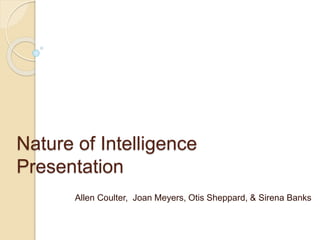Wk 3 team_d_assignment_nature_of_intelligence
- 1. Nature of Intelligence Presentation Allen Coulter, Joan Meyers, Otis Sheppard, & Sirena Banks
- 2. Multiple Intelligences ? Learning theories address the various ways people learn ? Gardner¡¯s theory of multiple intelligences suggests varying intelligence levels in nine areas (Kim, 2009) (Image Howard Gardner, 2014)
- 3. Howard Gardner¡¯s Theory of Multiple Intelligences (Kim, 2009)
- 4. Practical Intelligence ? Practical Intelligence is the ability to find a more optimal fit between themselves and the demands of the environment through adapting to the environment, shaping the environment, or selecting a new environment in the pursuit of personally-valued goals (Sternberg & Hedlund, 2002). ? Adult learners have the ability to use experience and skills of everyday living and apply it to knowledge in the classroom. ? Practical Intelligence and Tacit (Sternberg & Hedlund, 2002). ? Adult learners apply problem solving and personal experience to knowledge ? Known as ¡°street smarts ¡° and or ¡°common Sense¡± ? Knowledge not learned through training ? Knowledge not found in books
- 5. Practical Intelligence ? The Conceptualization of Tacit Knowledge ? Tacit knowledge is context-specific knowledge about what to do in a given situation or class of situations (Sternberg & Hedlund, 2002). ? Practical intelligence is implied knowledge. It is not a linguistic or a numerical form of knowledge it is more personal (Sternberg & Hedlund, 2002). ? Example: Adults learn through personal experience like learning a new language one may not be able to learn the language just by learning the rules of grammar they have to be around it hear it and pick it up. It can¡¯t be explained in words, it is simply understood.
- 6. Emotional Intelligence ? The internal factors that you develop over time; ? Why you feel the way you do ? Your moral compass ? Self management-how you handle things and how effective you are ? Aligning your actions with your passion ? How you put together relationships ? In 2013 Hill and Rivera defined emotional intelligence as the ability to be aware and in control of one¡¯s own emotions as well as empathic with others, the ability to motivate yourself.
- 7. Emotional Intelligence & Adult Learners ? Strive to meet external expectations ? Learn better ways to serve others ? Seek higher levels of professional advancement ? To make or maintain social relationships (Esposito, 2005) ? Encourage contacts between students and faculty ? Develop reciprocity and cooperation among students ? Use active learning techniques ? Give prompt feedback ? Emphasize time on task ? Communicate high expectations ? Respect diverse talents and ways of learning
- 8. Characteristics of Cultural Intelligence ? Transferring social skills from one cultural context to another ? Adjusting actions in regards to cultural context ? Incorporating knowledge from education and experiences ? Understanding of the emotional norms and behaviors in other cultures
- 9. Cultural Intelligences Impact ? Ascalon, Schleicher, and Born (2008) highlighted the impact of cultural intelligence¡ ? Facilitation of awareness of differences between cultures ? Uses role-playing scenarios is an effective training method ? Reduces ¡°one¡¯s knee-jerk responses can help one prepare for cross-cultural encounters (p. 120) ? Increases knowledge of different cultures, self-efficacy, awareness of the role of empathy, non-ethnocentrism, communication, and interpersonal skills
- 10. References Artist Unknown (2014). Photograph of Howard Gardner. Retrieved from http://www.quotessays.com/images/howard-gardners-quotes-4.jpg. Ascalon, Ma. E., Schleicher, D. J., & Born, M. Ph. (2008). Cross-cultural social intelligence: An assessment for employees working in cross-national contexts. Cross Cultural Management, 15(2), 109-130. Esposito. 2005. Emotional intelligence and andragogy: The adult learner. Thonburi, Thailand: 19th international conference, learning organizations in a learning world. Hill, Dianne. & Rivera, Eduardo. 2013. Online adult learning and emotional intelligence oxymoron's? St. Edwards University. Kim, I. (2009). The Relevance of Multiple Intelligences to CALL Instruction. Reading Matrix: An International Online Journal, 9(1), 1-21. Sternberg, R. J., & Hedlund, J. (2002, April). Practical Intelligence, g, and Work Psychology.. human Performance, 15(1/2), 143-160.









